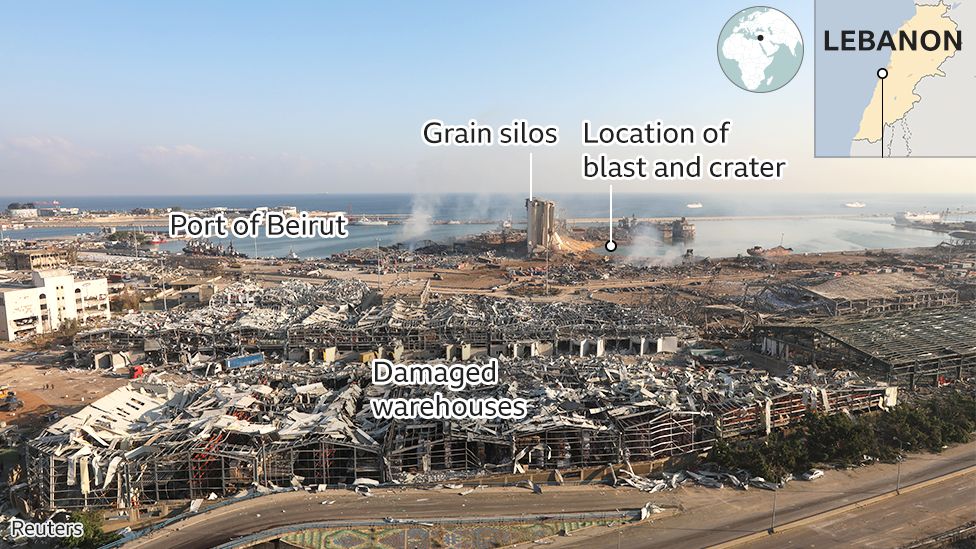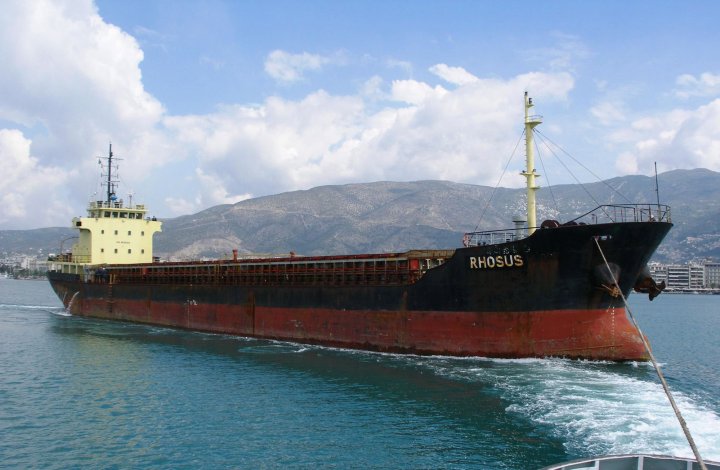
Beirut woke up to mourning and devastation today following a huge explosion at the city’s port on Tuesday. At least 140 were killed, with more than 5,000 wounded and some 300,000 people left homeless.
The international community is mobilizing to send medical assistance and aid to Lebanon, which was already struggling to handle the coronavirus pandemic while grappling with hyperinflation, unemployment, the shortage of basic goods and intractable political crises. Tuesday’s explosion is another weight on a city and a country well-versed in tragedy and hardship.
The exact series of events that led to the enormous explosion, which created seismic waves equivalent of a magnitude 3.3 earthquake, remains unclear. It appears to have involved fireworks stored in a warehouse close to 2,750 tons of ammonium nitrate—an explosive fertilizer—confiscated from a ship several years ago.
Lebanese President Michel Aoun told reporters soon after the disaster that the failure to deal with the stored ammonium nitrate was “unacceptable,” promising the “harshest punishment” for those found culpable. Authorities have launched an investigation and the committee is scheduled to present its findings within five days.
The explosion sparked a wave of speculation online, with theories ranging from domestic sabotage to Israeli airstrikes and even a nuclear detonation. President Donald Trump was among those suggesting the explosion was caused by a bomb—though presented no evidence to support his claim, which was dismissed by Lebanese officials.
But the real cause appears to be the systemic corruption and negligence that has long plagued Lebanon, with officials cutting corners and enriching themselves at the cost of the people’s safety.
Al Jazeera reported that senior Lebanese officials knew the ammonium nitrate had been stored in Hangar 12 of Beirut’s port for several years, and that its presence there risked a devastating accident. But officials at the port—infamous for the amount of public funds stolen over the decades—failed to deal with the threat
The ammonium nitrate was confiscated from a Russian-owned, Moldovan-flagged cargo ship—the Rhosus—in September 2013 when the tanker docked in Beirut after experiencing technical difficulties. The Rhosus had been on its way from Georgia to Mozambique, according to the ship-tracking website Fleetmon.
Ammonium nitrate is commonly used for fertilizer because its high levels of nitrogen are beneficial for plant growth. It is also a central component in mining explosives, and these qualities have prompted terrorists to use the product in homemade bombs—including Oklahoma City bomber Timothy McVeigh.
Lawyers at the Beirut-based Baroudi Legal firm represented the boat’s Russian and Ukrainian crewmembers, who were stranded on the ship after it docked. Lebanese officials prevented the vessel from sailing elsewhere and it was eventually abandoned by its crew and its owners. The explosive cargo was then moved to Hanger 12, which sat close to the country’s main north-south highway.
The years following saw multiple efforts to address the dangerous cargo. In 2014, then-director of Lebanese Customs Shafik Merhi wrote to an unnamed “Urgent Matters judge” seeking a solution. Customs officials sent at least five more letters over the next three years, Al Jazeera reported, asking for the ammonium nitrate to be addressed.
Proposed solutions included exporting the material, handing it to the Lebanese army or selling it to a Lebanese explosives company. A 2016 letter noted that officials had received no reply from judges.
“In view of the serious danger of keeping these goods in the hangar in unsuitable climatic conditions, we reaffirm our request to please request the marine agency to re-export these goods immediately to preserve the safety of the port and those working in it, or to look into agreeing to sell this amount,” the letter read. It too received no reply.
In 2017, Lebanese Customs Administration director Badri Daher started his tenure by writing to a judge again about the ammonium nitrate. He stressed the “the danger … of leaving these goods in the place they are, and to those working there.”
But almost three years later, the ammonium nitrate was still in Hanger 12. Videos from nearby showed the enormous explosion—felt some 100 miles away on the Mediterranean island of Cyprus—and subsequent shockwave tearing through downtown Beirut.
Lebanon shares its border with conflict-torn Syria and Israel, with whom the country is technically still at war. The seaport was vital for the imports that account for much of the country’s food and other basic goods, but now sits almost entirely destroyed.
Lebanon’s Prime Minister Hassan Diab said Tuesday that the explosion was a “great national disaster” and promised that “all those responsible for this catastrophe will pay the price.”
But Lebanese people too will pay the price for the negligence and apathy of the country’s political elite, set to face yet more uncertainty and hardship as the beleaguered nation struggles to get back on its feet.
THE TIMES
Updates that call for an independent investigation
The following updates call for a proper independent and transparent investigation into the whole issue that led to the disaster
Ex-captain of the Rhosus cargo ship blames Lebanese authorities for blast
Boris Prokoshev, the former captain of the ship that brought the 2750 tonnes of ammonium nitrate to the Beirut, said Lebanese authorities were “very well” aware of the dangers posed by the vessel’s cargo.

“It’s the government of Lebanon that brought about this situation,” Prokoshev told the Associated Press news agency from his home in the Krasnodar region of Russia.
His ship, the MV Rhosus, was not supposed to be in Lebanon at all, he said.
When it set sail from the Georgian Black Sea port of Batumi, it was bound for the Mozambiquan port of Beira. But the Rhosus made a stop in Beirut to try to earn extra money by taking on several pieces of heavy machinery.
The machinery proved too heavy for the Rhosus, however, and the crew refused to take it on. And the ship was soon impounded by the Lebanese authorities for failing to pay port fees, and never left the port again.

This is an undated file photo, made available by Tony Vrailas, of the Rhosus, the vessel which is suspected of having brought the 2,750 tonnes of ammonium nitrate to Beirut,before it was impounded when the owner of the vessel allegedly abandoned it.
“They knew very well that there was dangerous cargo there,” Prokoshev said. “In my opinion, they should have even paid him (owner of the boat) to take the dangerous cargo, a real headache, out of the port. But they just arrested the ship instead.”
Mozambique denies knowledge of ship tied to explosion
Mozambican port authorities have denied any knowledge of the ship carrying the cargo of ammonium nitrate said to have caused the devastating explosion in Beirut.
They were reacting to widespread reports that the ammonium nitrate had arrived in Lebanon in 2013 on board a Moldovan-flagged ship sailing from Georgia and bound for the central port city of Beira.
“The port operator was not aware that the vessel MV Rhosus would dock at the port of Beira,” the Beira ports authority said in a statement.
It said typically the arrival of any ship at the port “is announced by the ship’s agent to the port operator seven to 15 days in advance”.
Welding job
A picture posted online late Tuesday appeared to show workers welding a warehouse door next to stacks of 1/2-ton bags of ammonium nitrate
.
This photo is making the rounds this evening on Telegram. Appears to show numerous parcels of bagged Ammonium Nitrate.
— The Intel Crab (@IntelCrab) August 4, 2020
Was going to write this off as horse shit, but those are the exact same warehouse windows.? pic.twitter.com/RLEe3XWawA
The following video shows the warehouse as it started burning
Agencies

Leave a Reply
You must be logged in to post a comment.